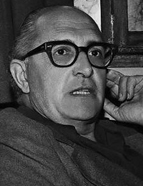

From 1948 to 1959, when he left for exile in Brazil, Sena worked as an engineer for the Junta Autónoma de Estradas[the Portuguese Road Authority]. During this period, he became acquainted with the country “as few others ever will because few will have used that opportunity to get to know the country from a cultural perspective” (“Falando com Jorge de Sena...” [" In a Conversation with Jorge de Sena …], p. 415). Over the years in which he worked as a civil servant, he translated works which, to some extent, disseminated equalitarian and libertarian values, such as Hemingway’s Fiesta (1954), Caldwell’s Georgia Boy (1954), and Malraux’s Man’s Fate (1958). Sena also wrote for acclaimed literary journals such as A Presença, O Unicórnio, Seara Nova, Vértice and Cadernos de Poesia, which published Perseguição [Persecution] (1942), his first book of poems,. The 1958 presidential elections, which sparked a wave of protest in Portugal, and his involvement in the Revolta da Sé, a failed coup attempt against the dictatorship of Salazar set for March 1959, were the main reasons behind Jorge de Sena's decision to leave his country (Vasques, Jorge de Sena, Uma Ideia de...,[Jorge de Sena, An Idea about…] pp. 231-232).
About to turn 40, and with no hope of living in a free Portugal that would offer him the teaching career he had always dreamt of, Sena capitalized on the invitation to participate in the IV Colóquio Internacional de Estudos Luso-Brasileiros [4th International Conference on Portuguese-Brazilian Studies], organised by the Universidade da Bahia [the University of Bahia], and went into voluntary exile in Brazil. A short time later, he accepted the post of professor of Theory of Literature at the newly founded Faculdade de Filosofia, Ciências e Letras de Assis [Faculty of Philosophy, Science and Arts of Assis], in São Paulo. On the other side of the Atlantic, he continued to engage in political opposition against Salazar’s regime. Humberto Delgado, also an exile in Brazil, joined the opposition from overseas and restructured the Movimento Nacional Independente [the Independent National Movement], which published the newspaper Portugal Livre [A Free Portugal]. There was also another movement, namely the Centro Republicano Português [the Portuguese Republican Centre] in which the Movimento de Unidade Democrático was integrated, both supported by the Comité de Intelectuais Portugueses [Portuguese Intellectuals Committee].As a result of his connection to this Committee, Jorge de Sena began to collaborate with the newspaper Portugal Democrático [Democratic Portugal], which was headquartered in São Paulo. It was in this newspaper, where he was a member of the newsroom team for three years, that Sena published articles that caught the attention of the PIDE.
